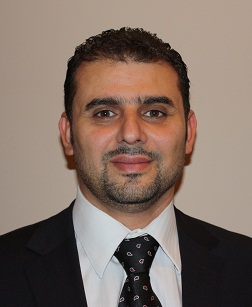 |
Prof. Mona Diab, USA - Facebook AI
Abstract: Information propagation in an era of Infodemics: The role of language content
How can we reliably detect rumors and their propagation? Are social network connections sufficient? What is the role of message content and how does it compared to social network factors? In this talk, I will share some insights from our studies on the impact of language in (mis) information detection and spread. Furthermore I will share with you some work on the role of causality and coherence in the propagation of such content, finally I will discuss the nuance of satire vs. offensive speech and how impactful that is in the context of misinformation detection. |
|
Biography:
Mona Diab is a Research Scientist with FB AI and she is also a full Professor of CS at GW University where she heads the CARE4Lang NLP Lab. Before joining FB, she led the Lex Conversational AI project within Amazon AWS AI. Her interests span building robust technologies for low resource scenarios with a special interest in Arabic technologies, (mis) information propagation, computational socio-pragmatics, Natural Language Generation evaluation metrics, and resource creation. She has served the community in several capacities: Elected President of SIGLEX and SIGSemitic. She is also a founding member of *SEM conference. She currently serves as the senior area chair for multiple top tier conferences AAAI, EMNLP, ACL, etc. She has published more that 220 peer reviewed articles.
|
|
 |
Prof. Bhavani Thuraisingham, The University of Texas at Dallas, USA
Abstract: The Role of Artificial Intelligence and Cyber Security for Social Networks and Internet of Transportation
Social networks such as Facebook and Twitter are being used for the good of humanity. For example, these systems can inform the users of the spread of diseases, provide for the support for emergency preparedness as well as enable the sharing of information so that the users are better informed about various topics such as politics and sports. Various analytics tools are being applied on these systems to extract information not only about the users but also about the contents of their posts. While the nuggets that are extracted could help humanity, they can also compromise individual privacy. In addition, social media systems have also been the vehicle for spreading false rumors that could be damaging to the individuals and cause great harm. In addition, the social media systems as well as the analysis techniques could be compromised due to cyber-attacks and as a result the information posted could be compromised.
Another type of network that AI and Cyber Security are being applied is the Internet of Transportation. With the advent of the web, it is now possible to collect, store, manage, and analyze vast amounts of sensor data emanating from numerous devices and sensors including from various transportation systems. Such systems collectively are known as the Internet of Transportation Systems. However, security and privacy for the Internet of Transportation and the infrastructures that support it is a challenge. Due to the large volumes of heterogeneous data being collected from numerous devices, the traditional cyber security techniques such as encryption are not efficient to secure the Internet of Transportation. Some Physics-based solutions being developed are showing promise.
This keynote presentation will be divided into two parts. The first part explores the use of the applications of artificial intelligence (AI) techniques for social media as well as examines how social media systems could be protected from cyber-attacks. In addition, the privacy violations that could occur are also addressed. The presentation will also explore some of the emerging challenges we are faced with due to the fake news being posted and the novel cyber-attacks on social media systems. The second part of the presentation examines the developments on securing the Internet of Transportation and its supporting infrastructures as well as the privacy implications. Finally, it describes ways in which AI and Security could be incorporated into the Internet of Transportation and Infrastructures.
|
Biography:
Dr. Bhavani Thuraisingham is the Founders Chair Professor of Computer Science and the Executive Director of the Cyber Security Research and Education Institute at The University of Texas at Dallas (UTD) and is also a visiting Senior Research Fellow at Kings College, University of London. Her 40-year career includes Industry (Honeywell), Federal Research Laboratory (MITRE), US Government (NSF) and US Academia. Her research interests are on integrating cyber security and artificial intelligence/data science for the past 35 years (formerly known as computer security and data management) including as they related to public policy, terrorism and healthcare. The depth and breadth of her research are reflected in her being elected a Fellow of multiple prestigious STEM organizations including a Fellow of the ACM (Computing), IEEE (Engineering), AAAS (Science), NAI (Technology Innovation), and the British-based IMA (Mathematics).
She has received several awards for her research including the IEEE CS 1997 Technical Achievement Award, ACM SIGSAC 2010 Outstanding Contributions Award, the IEEE ISI 2010 Research Leadership Award, the IBM 2013 Faculty Award, the IEEE CS Services Computing 2017 Research Innovation Award, the ACM CODASPY 2017 Lasting Research Award, the IEEE Comsoc Communications and Information Security 2019 Technical Recognition Award,, the 2013 IBM Faculty Award and the ACM SACMAT 10 Year Test of Time Awards for 2018 and 2019 (for papers published in 2008 and 2009). She has graduated numerous female PhD students as well as those from the African American, Hispanic American, and LGBTQ communities at UTD and co-chaired the Women in Cyber Security Conference (WiCyS) in 2016, delivered the featured address at the 2018 Women in Data Science (WiDS) at Stanford University, chaired a plenary panel on Diversity, Equity and Inclusion at
IEEE ISI (Intelligence and Security Informatics) in 2020, and also received the Dallas Business Journal 2017 Women in Technology Award. Her work has resulted in 130+ journal articles (e.g., several IEEE and ACM Transactions), 300+ conference papers (e.g., ACM KDD, IEEE ICDM, ACM OOPSLA, IEEE ICDE, VLDB), 170+ keynote and featured addresses (e.g., EDBT, ACM SACMAT, IEEE ICKG), seven US patents, fifteen books as well as technology transfer of the research to commercial products and operational systems. She received her PhD from the University of Wales, Swansea, UK in Theory of Computation, and the prestigious earned higher doctorate (D. Eng) from the University of Bristol (England), UK for her published research in secure data management.
| |
|
 |
Prof. Abdulmotaleb El Saddik, University of Ottawa, Canada
Abstract: Multimedia Convergence for Citizens’ Well-Being
A digital twin is a digital replication of a living or non-living physical entity. By bridging the physical and the virtual worlds, data is transmitted seamlessly allowing the virtual entity to exist simultaneously with the physical entity. A digital twin facilitates the means to monitor, understand, and optimize the functions of the physical entity and provides continuous feedback to improve quality of life and wellbeing of citizens in smart cities. In this research program, we explore the design and development of frameworks, methodologies and methods regarding the convergence of multimedia technologies (AR/VR, AI, IoT, Big Data, Cybersecurity and 5G) towards the digital twin for health care. We address diverse challenges and the open research questions. |
|
Biography:
Abdulmotaleb El Saddik (FRSC, FIEEE, FCAE, FEIC), is Distinguished University Professor and University Research Chair in the School of Electrical Engineering and Computer Science at the University of Ottawa. He is an internationally-recognized scholar who has made strong contributions to the knowledge and understanding of multimedia computing, communications and applications. Prof. El Saddik is the director of the Medical Devices Innovation Institute (MDII) and the Multimedia Computing Research Laboratory (MCRLab). He is Senior Associate Editor in several flagship journals and has served a General Chair and/or Technical Program Chair of more than 50 international conferences symposia and workshops on collaborative hapto-audio-visual environments, multimedia communications and instrumentation and measurement. He is a leading researcher in smart health, Internet of things, haptics, social media, and collaborative and ambient interactive media and communications (smart cities). He has authored and co-authored three- patents, five books and more than 550 publications. He has received research grants and contracts totaling more than $18 million and has supervised more than 120 researchers.Prof. El Saddik is a Fellow of the Royal Society of Canada, a Fellow of the IEEE , elected Fellow of the Canadian Academy of Engineering and Fellow of the Engineering Institute of Canada.
|
|
 |
Prof. Denis Helic, TU Graz, Austria
Abstract: Mining Digital User Traces
While working on online platforms users leave a plethora of digital traces including click & edit logs, social media posts, likes & votes, and similar. By analyzing user digital traces, we gain insights into (i) individual user behavior and, (ii) the user social interactions. These insights broaden our understanding of user interactions and support system operators in optimizing their systems.
My talk will follow these components of user behavior: in the first part I will present my research on individual user behavior on the example of sequential user behavior. Here, we model sequential user behavior with Markov chains and express the hypotheses about their behavior as prior distributions over these Markov chains. I will present a few applications of this framework such as user navigation, ontology editing or urban movements.
In the second part, I will present my work on user social interactions on the example of user activity. Here we ask the question, how user mutual influence affect the sustainability of communities. We find that growing communities exhibit high early stage activity by a small core of power users reacting to the community as a whole, and strong long-term activity by casual users, suggesting community openness. Our results can inform community operators on which users to focus at different developmental stages of a community. Lastly, I will conclude the topic on user social interactions by presenting a novel Bayesian approach to parameter estimation of multivariate point processes for modelling of discrete user events. |
|
Biography:
Denis Helic is a tenured Associate Professor at the Institute of Interactive Systems and Data Science, TU Graz.
Denis has been the project leader in a number of national and international basic and applied research projects
some of which have been awarded with national and international prizes. He has published more than 130 research papers in various international journals and conferences including top venues such as WWW, KDD, CIKM, CSCW, Hypertext, IUI, as well as ACM Trans. on the Web, ACM Trans. on Intelligent Systems and Technology, ACM Trans. on Social Computing,
and PLOS ONE. He has won a number of Best Paper Awards including the prestigious Best Paper Award at the 24th ACM on the World Wide Web
WWW 2015.
Denis' research interests include data science, Web, Web & network science, user behavior, knowledge discovery & data mining, recommender systems, social computing, and social media.
|
|
 |
Prof. Robert Wrembel, Poznan University of Technology, Poland
Abstract: Still Open Problems in Data Warehouse and Data Lake Research
The traditional DW architecture and technologies for some years have been evolving towards handling big data. It has been agreed that the industry to-be standard that allow to integrate big data is a data lake (DL) architecture. A data lake is a repository that stores a vast amount of heterogeneous data in their original formats. Typically, it includes unstructured data from external data sources. It may also stage together internal company DSs (i.e., well-structured, of very high quality) and external DSs (i.e., unstructured, of very low quality). Such staged DSs are then integrated (by ETL processes, a.k.a. data processing workflows - DPW or data processing pipelines - DPP) in another repository in structured way - this repository is a counterpart of a DW. DL architectures are more and more frequently being developed in cloud eco-systems, e.g., Azure, GCP, or AWS. Despite the fact that the DW technologies have been developed for at most 30 years by multiple research communities and IT industry (resulting in mature and advanced technologies and methods), there still exist research problems to be solved. Big data make the (already difficult) problems even more difficult and add new challenges. The following ones will be highlighted in this talk; • handling the impact of the evolution of data source structures on an integration layer, • optimizing executions of data processing workflows, • cataloging available data sets and metadata management, • assuring high quality of data (especially duplicate elimination) in a DW and DL. This talk will present the latest research in this field and cover the current challenges. |
|
Biography:
Robert Wrembel is an associate professor in the Faculty of Computing, at Poznan University of Technology, in Poland. In 2008 he received the post-doctoral degree in computer science (habilitation), specializing in database systems and data warehouses. He has been a deputy dean of the Faculty of Computing, in terms 2008-2012 and 2012-2016. Involved in 8 research and 8 industrial projects in the area of data processing technologies; consultant at software house Rodan Systems (2002-2003); lecturer at Oracle Poland (1998-2005). Currently he leads at his University the Erasmus Mundus Joint Doctorate Programme "Information Technologies for Business Intelligence - Doctoral College" (2013-2020). Robert Wrembel visited numerous research and education centers, including: Universitat Politècnica de Catalunya - BarcelonaTech (Catalunya), Université Lyon 2 (France), Universidad de Costa Rica (Costa Rica), Klagenfurt University (Austria), Loyola University (USA), INRIA Paris-Rocquencourt (France), and Université Paris Dauphine (France). In 2012 he graduated from a 2-months innovation and entrepreneurial programme at Stanford University. In 2013 he has done an internship in a BI company Targit (USA). In 2010 he received the IBM Faculty Award for highly competitive research, in 2011 he was awarded the Medal of the Committee of National Education (from the Minister of National Education), in 2016 - the Silver Medal for Long-lasting Service (from the President of the Republic of Poland), in 2019 - IBM Shared University Research Award, and in 2019 - International Federation for Information Processing (IFIP) Service Award. He is a member of ACM, country representative in IFIP Technical Committee TC 2 - Software: Theory and Practice, and a member of IFIP Working Group 2.6 (Database). Since Apr 2018 he is a regular editorial board member of the Data & Knowledge Engineering journal.
|
|
|
|